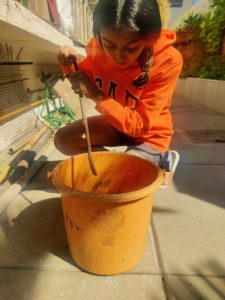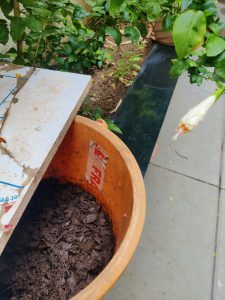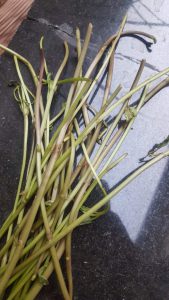Growing up in a joint family, I have always noticed the amount of kitchen waste that is produced in a single day (a considerable amount) in my house. Time and again, we have all learnt about the importance of recycling. So, during the summer break, I decided to take up the initiative to make compost using garden and kitchen waste. It was a small step towards being environmentally friendly, whereby I was recycling a lot of organic waste that would have otherwise ended up being dumped somewhere. Having a garden, I could easily use the compost I made instead of chemical fertilizers.
Learning outcomes achieved: LO2, LO3, LO4, LO6 and LO7
LO-2. Demonstrate that challenges have been undertaken, developing new skills in the process
Even though I have studied about this in junior school, I had never actually done it in practise. I found myself clueless in the beginning and did what any other person would do, i.e. surf the net. It was challenging since it was a long process and I learnt something new over the month.
LO-3. Demonstrate how to initiate and plan a CAS experience
Trying a new activity like this requires researching and planning. I read a number of articles and watched videos to comprehend the process thoroughly. I had to find the correct equipment, and understand the different steps that affected my final outcome.
LO-4. Show commitment and perseverance in CAS experiences
The entire activity was a month long process and hence needed commitment. I had to add different layers of brown, green and vegetable waste every day. I also had to ensure that the mixture had enough moisture. Furthermore, it had to be stirred from time to time so that the pile could be aerated which assisted the breakdown process. Summing it up, I had to keep a check on the bin everyday to ensure the best results.
LO-6. Demonstrate engagement with issues of global significance
Our increasing awareness and education regarding our environmental health is helping us make sustainable decisions along the way. We all know the effects of greenhouse gases on global warming. Organic waste accumulating in landfills generates, methane, a potent greenhouse gas. By composting wasted food and other organics, methane emissions are significantly reduced. Hence, composting helps us complete the cycle by returning what we grow back to the soil. It’s the bare minimum we can do which eventually adds aup and makes a difference.
LO-7. Recognize and consider the ethics of choices and actions
Over this one month, I realised that the amount of kitchen waste produced in my house hold was significant. I understood how I could make environmentally ethical choices through small steps and make a difference to society. I felt like this decision and activity was a win-win scenario. It helped the environment and the soil in my garden.
The learner profile attributes I could connect to this activity are inquirers, knowledgeable, and caring. I researched to understand the process and the requirements of the task on hand. I explored different ways and methods and combined learnings from different sources. I felt like even though it was a small step, I had made a positive difference.
Evidence:


